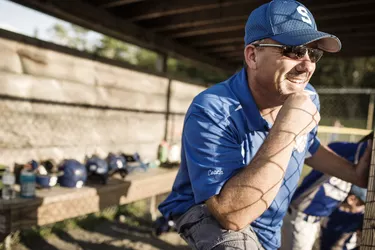
Major League Baseball (MLB) employs many more people than just baseball players. There are managers, analysts, statisticians and coaches for every position and play, including hitting. How much do hitting coaches and baseball coaches make in MLB? Salary ranges for coaches and other employees may be quite large depending on the team for which they coach. The process for becoming a hitting coach varies greatly too.
The Average Salary of a Hitting Coach in MLB
Video of the Day
It's helpful to understand MLB hitting coach salaries compared to other coaches for various sports at every level (high school, amateur, professional, college and so on). The U.S. Bureau of Labor Statistics compiles information about wages and salaries and says that coaches and scouts for spectator sports earned an average salary of $38,970 in 2021. MLB hitting coaches typically make between $50,000 and $60,000.
Video of the Day
Many people might expect a baseball coach in professional sports to earn more money, and many MLB coaches do. The top 10 percent of people in this category earned more than $80,000. The league rarely releases contract details for its coaches, so definite figures aren't always available. Still, experts estimate that the highest-paid baseball coaches in 2022 will earn around $5 million per year. Among them are Joe Maddon, Mike Scioscia and Bruce Bochy.
About Major League Baseball Hitting Coaches
Recently, some media attention has been given to the fact that these coaches usually don't have long tenures in the majors. There is a high turnover rate for this position, and after the 2021 season, 20 of the league's 34 batting coaches lost their job. The New York Yankees, the Red Sox and the Mets were among the teams firing coaches. The Houston Astros, Tampa Bay, the Atlanta Braves, and the Blue Jays were among the MLB teams who kept their hitting coaches, who may have higher salaries.
Much of this was attributable to the conclusions of the league's statisticians. Strike-outs were up, and batting averages fared much poorer. These weren't aberrations, as these trends hit new lows after years of falling.
Some experts think these changes result from better pitchers pitching and the work of the pitching coaches. Still, it's the job of the hitting coaches and assistant coaches to keep pace. This sudden increase in job openings may have driven recent salaries above the average for coaches in other positions.
How to Become a Hitting Coach in MLB
You might assume that you need to have an illustrious career at bat in the big leagues to become a coach for future MLB players. Some hitting coaches are indeed former players who set their own batting records. However, the U.S. Bureau of Labor Statistics notes that other skills can be just as valuable, and baseball is primarily a numbers game. While athletic skill plays a huge part, you must understand how math and science can impact batting. Physics and geometric principles can be incredibly impactful for a baseball coach.
To do a good job coaching hitters, you must grasp how actual plays impact statistics and what statistics tell you about the team's needs. You have to be able to take that very technical information and translate it into action. They also need to work with other coaches, including bullpen coaches, bench coaches, first base coaches, the head coach, the general manager, third base coaches and other coaching staff if they ever want to see the World Series. That can be challenging.
Finally, they must have comprehensive knowledge of the human body, nutrition, muscle groups and how whole health impacts athletic performance. A lot of coaching is physical and mental training, so a background in those fields can be helpful. Most major league coaches start at lower levels, especially if they aren't former players, and they may coach college teams or begin in Division II or Division III. Many coaches work in minor league baseball with minor league players for a period as well. Of course, coaching is rewarding, and many people also do it on a volunteer basis.